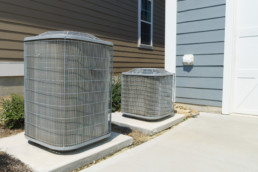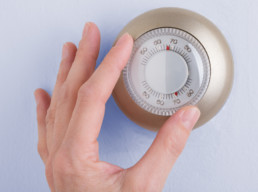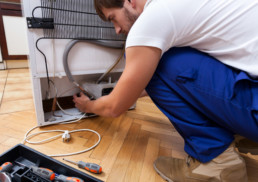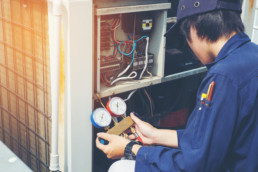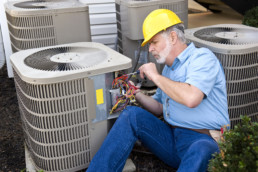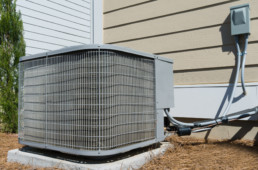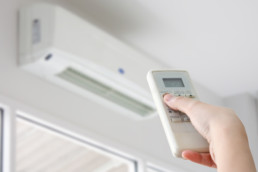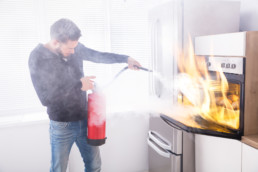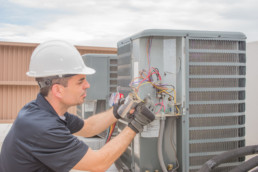What Are the Most Common Air Conditioner Noises?
Air conditioners can contain a symphony of noises. Each one can tell you a lot of what problems your air conditioner is having. It could be something easy, like chirping, or a high-pitched shrieking!
You need to know what these sounds mean and how to describe them to the technician. These noises are not for the faint of heart! So read on to learn what the most common air conditioner noises mean!
Whistling or Hissing
A persistent whistling or hissing noise could be a sign of a refrigerant leak. The source could be a leaky valve or in the refrigerant line itself. At the first hints of whistling or hissing, call your local air conditioning repair shop to get it looked at.
Keeping the unit off until you get the unit looked at is very important as the most common refrigerant is Freon gas and breathing the gas could be very dangerous. The hissing could become a high-pitched shriek. If you hear that, immediately turn the unit off and call your technician.
Buzzing
Buzzing could indicate an electrical problem in a few air conditioning components. It could be the condenser fan motor, the circuit breakers, or the contactor relay switch, among other things. The buzz you hear is electricity jumping between the circuitry and happens when air conditioner units get older.
It's important to get this fixed, as this could potentially start a fire. Electrical fires are one of the leading causes of wildfires in the Western United States. When you hear the buzzing, especially with an outdoor unit, turn it off and call your technician immediately.
Metallic Grinding Noises
It's never a good sign when you hear a metal-on-metal grinding sound, and in the case of an air conditioning unit, it can be a serious problem. The noise means either a compressor problem or a bad belt. With compressors, the grinding noise comes from the pistons, which compress the refrigerant, start to wear out.
Banging
If you hear some banging coming from your air conditioning unit, it could indicate that something inside is loose. It could be anything, a connecting rod, a piston pin, or a crankshaft making extra noise. Make sure to contact your technician to get things tightened up!
Chirping
If any extra noises starting coming from your unit, chirping is the one you want. It's likely an indicator of friction between parts. Examples include the fan rubbing against the blower cage, a worn-out fan belt, or dry motor bearings.
Any of these can be easily corrected by your technician, but are not truly urgent. If the noise sticks around for a long time or develops into a shrieking noise, then it might be a series issue. Call your technician right away!
Air Conditioner Noises
Your air conditioning units can make a lot of noise. Each one of the air conditioner noises indicates specific problems, so make sure to keep your ears out! And if you live in and around Jasper, Texas, make sure to call A-1 Refrigeration and Air Conditioning!
3 Most Common Furnace Problems and Repairs for Homeowners
A malfunctioning furnace doesn’t just raise your monthly energy bills. It can even be dangerous to you and your family’s health.
According to the NFPA, faulty home heating devices are the most common cause of dangerous house fires during the winter months. This equipment led to over 500 deaths each year between 2014 and 2018.
Don’t let your home become a statistic. Read on for insider information on diagnosing three common furnace problems affecting Jasper, TX, and the Lakes Area homeowners.
1. Your Furnace Filters Need Cleaning
Dirty filters are one of the most common electric furnace problems–it often affects gas furnaces, too. If your filter needs a clean, your furnace will have to work a lot harder, leading to higher energy bills and, potentially, a damaged limit switch.
Maybe it’s been freezing Jasper, TX, and the Lakes Area, and you’ve been using your furnace a lot. Perhaps the fan is set to “on” instead of “auto,” or your service provider installed your furnace air intake in a dusty area. These are just some situations leading to dirty filters.
2. Your Furnace Is Cycling On and Off
If your furnace is turning on and off frequently, the heating in your home will be frustratingly unpredictable. Some rooms might be warm, while others left out in the cold. Or the temperature might fluctuate through the course of the day.
One of the most common furnace problems in cold weather, this issue is most often the consequence of faulty furnace parts. You likely have a defective thermostat or flame sensor that a professional needs to review. Blocked vents or a dirty blower wheel might be causing low airflow or, in rare cases, you may have installed a furnace that is too big for your needs.
3. Your Furnace Is Too Old
Our furnaces are large machines with a lot of moving parts. They work hard to heat our homes. So it’s reasonable to expect that they won’t last forever.
Whether you’re dealing with electric or gas furnace blower problems, many signs show your furnace needs replacement.
These include:
- Your furnace is over 15 years old
- You see dust coming out of the ducts
- The pilot flame looks yellow instead of blue
- Cold air is coming out of your furnace
- Your heating bills are suddenly astronomical
If your furnace meets any of the criteria above, it might be time to consult with your local heating specialist about getting a new heating system installed.
Replacing a furnace is a significant investment. Thankfully, most heating companies offer financing options, making purchasing a new furnace a stress-free experience even for low-income households.
Maintenance Prevents Common Furnace Problems
One of the best ways to avoid common furnace problems, and as a result, avoid expensive repairs to your furnace, is to keep your heating system well maintained. Check and cleanse the furnace filter and blower motor. Unblock household air vents, and make sure the flue is clear.
To ensure you don’t get caught out in the cold this winter, schedule a service with A1 Refrigeration & Air Conditioning. We’ve been looking out for Jasper, TX, and the Lakes Area homeowners since 1981!
5 Common Heating Issues To Look Out for This Winter
Since it's getting colder outside, shut off your AC and turn on your fireplace. What beats sitting under a blanket on a cold winter night while watching a movie with their family?
But, there's no guarantee your heater will work this year. So, it's best to learn how to fix those problems before you start up your heater.
Keeping reading to find out 5 common heating issues homeowners face during wintertime.
1. Carbon Monoxide Leaks
You can't taste or smell carbon monoxide. So, won't know it's inside your home. Well, first thing's first: install a carbon monoxide detector. Buy one for each room with a heater.
Also, it's important to know the signs of carbon monoxide poisoning. The symptoms of carbon monoxide poisoning include:
- Dizziness
- Malaise
- Shortness of breath
There are a few other symptoms as well, but these are the most common ones. Leaks of carbon monoxide are most likely to occur if your furnace is over a decade old.
2. Lack of Heat
It's very disappointing when your heater isn't working, especially during winter. If your heater isn't working no matter what you try, call a professional.
If you own a heating pump, make sure there isn't a build-up of ice and snow on top of it. Turn on your heat pump's defrost setting, that way, it'll keep up with the ice and snow.
3. Short Cycling
Short cycling happens when your heater turns on and off after a short while. Short cycling is one of the many common heating issues you might face.
Your heater keeps turning on and turning off after a short period of time, check the thermostat. Short cycling is a sign that there might be an issue with your heater's thermostat. A thermostat that's positioned directly under light might heat up too fast, hence why it's short cycling.
4. Dry Air
Dry air isn't good for sensitive skin or your heater. Low humidity affects the heating system in your home. Dry air doesn't hold as much heat as humid air, so it takes time for the temperature to rise.
There are a few things you can try to combat dry air in your home. Try adding a bypass humidifier to your heater or furnace. You can buy a portable humidifier, too.
5. Dirty Filters
During periods of low usage, the filters inside your heater will collect dust and grime. If you don't want heating issues, clean the filters.
If there's a blockage inside the filter, it'll stop heat from wafting throughout your home. If the air inside your home isn't circulating, that's a sign of a blocked filter.
Before fixing the issue, make sure the fan and motor are working properly. Remove the blockage if there is one. If the filter inside your heater is bent or discolored, replace it.
Contact A1 Refrigeration and Air Conditioning for Heating Services
Dealing with heater and HVAC problems isn't fun for any homeowner, but there are a few things you can do. First, target the problem before it starts. Check your thermometer or thermostat to make sure it's working.
Dry air, a clogged filter, and short cycling are a few common heating issues. If you can't solve them yourself, it's best to call a professional right away.
For more articles about heating issues, check out our website today. And contact us to learn more about our services and expertise.
Is Your Refrigerator Not Cooling? Here's What to Do Next
It's hard to know where to start when your refrigerator isn't working. Problems like a refrigerator not cooling can be a real pain and possibly expensive fix.
But what can you do to troubleshoot a problem with your warm refrigerator?
Here are some things to look for and some things you can do to fix your refrigerator yourself.
First Thing's First
There a couple of obvious things that should be first on your list to check.
Make sure your refrigerator is plugged in and there is nothing wrong with the power cord. The light should still be working when you open the door.
Check the thermostat. It may have gotten accidentally turned down. If it's at the right setting, or it still doesn't work when turned back up, it may be the cause of your issue. If so, replacement thermostats are relatively cheap and easy to replace.
Is your fridge packed to the gunnels? Overstuffing a refrigerator prevents cold air from properly circulating. Filling your fridge to around 3/4 full should allow sufficient airflow.
Another thing to check is that the rubber door seals are in full contact with the fridge. if a rubber seal is ripped, or if any of the door hinges are loose, it can let the cool air escape and let warmer outside air in.
Refrigerator Not Cooling?
Once you've ruled out those potential issues, it's time to take a look at the fridge's mechanical components.
If you notice your refrigerator making constant noise, or being louder than usual, the compressor may be malfunctioning. Unfortunately, if this is the case you may need the help of professional refrigeration services.
Dusty or dirty condenser coils won't function as efficiently as clean ones. Giving the coils a clean with a small brush and vacuuming out any debris should help the coils operate normally.
If your fridge has a condenser fan, check it is still operating. It is responsible for keeping the compressor and condenser coils cool, so if it is broken you may have to replace the fan's motor.
An evaporator fan is responsible for circulating the cool air produced by the evaporator coils through the freezer then the fridge. Usually accessible through a panel in the back of the freezer, a good clear out of any dirt and debris should help it function normally.
If that doesn't work, you may have to replace the evaporator fan.
The air inlet damper lets cold air from the freezer pass into the fridge's fresh food compartment. If it gets broken or clogged, it will prevent proper circulation. You may need to replace it if it doesn't open and close correctly.
If All Else Fails
If you are still unable to diagnose the issue with your refrigerator not cooling, it's time to get your fridge repaired by a professional.
In the Jasper, TX area, A-1 Refrigeration & Air Condition is the leading heating and cooling company. Skilled, professional technicians deliver prompt, reliable services to customers in Jasper and the lakes area.
If you need the help of a professional technician, check out our website for information on the services we provide and how to contact us.
Don't Get Caught in the Cold With These Essential Furnace Maintenance Tips
Are you worried about the upcoming winter season?
The country is now gearing up for the frosty season because of this year's winter weather outlook. One way to brace the cold breeze is to check and maintain your furnace before the season starts. If you want to keep your family warm and safe during the winter, you’d better do it now!
Do you want some furnace maintenance checklist to guide you? Look no further than this article right here! Here are the annual furnace maintenance tips you should know about.
Clean the Furnace Filter
When was the last time you cleaned the filter? To lengthen the lifespan of your furnace, clean or change the filter every 3 to 4 months.
Turn the power off and open the door panel of the furnace. Find the filter inside the compartment, in the cold air return duct or entrance of the blower chamber. Slide the filter out and use a soft-tipped paintbrush to avoid damaging the appliance.
Examine the Blower Motor
The blower motor is the fan that distributes the warm air from the furnace into your home. It is crucial for reaching the desired temperature and usually near the furnace filter, you might as well check it out.
Are you hearing strange sounds coming out of your furnace? Loud bangs mean there’s a delay on the ignition or expanding and contracting air ducts. For rumbling noises longer than usual, it might release carbon monoxide because of the combustion and leads to air poisoning.
If you can’t figure it out on your own, call your local HVAC technician immediately for safety.
Check the Air Vents and Ducts Around the House
Can you feel the warm air through the air vents and ducts? Make sure no furniture and appliances are blocking the airways. Obstructing the air furnace filter will keep the warm breeze away from your home!
Too much debris and dust will not only be dangerous for the appliance but for your whole family, too. You should take a damp rag and clean the vent cover. Use the vacuum cleaner inside the air vents and ducts for deeper cleaning.
If you can’t simply take out the dust in the heating ducts or the bills increased out of nowhere, we have some bad news for you. It’s some of the warning signs the end of your furnace lifespan is nearing. You should think about buying a new one altogether if the cost of the repair is too much.
Inspect the Exhaust Flue
Did you know how much smoke, fumes, and unattractive smells are coming out of the furnace? Exhaust Flue is a great way to regulate and vent the toxic air from the furnace to the outside safely.
Take out any dirt or debris accumulated in the vent every 3 months. Check the flue pipe for corrosion, holes, loose and damaged parts. For gas furnace maintenance and repair, every furnace has proper sizing and layout of the whole venting system.
If you don’t have enough knowledge about furnaces in general, leave it to the professionals.
Try These Essential Tips for Furnace Maintenance
Here are some of the best furnace maintenance tips to beat the winter this season. Regular maintenance is the ultimate key to extend the lifespan of your appliances. It’s the only way to get it working when you needed them!
Do you need help maintaining your furnace? Don’t hesitate to contact us today for professional consultation and repair services!
5 Tips on Choosing an AC Repair Service for Homeowners
The average central air conditioning unit lasts about 12-15 years.
If you live in a hot climate, you know how important the air conditioner is during the warm summer months. But what happens when your AC is not functioning right or needs repair?
If you're a homeowner, you'll have to contact an AC repair service to fix your AC. You'll want to find an experienced, knowledgeable AC repair company.
You'll need to do a bit of research and know what you're looking for. Want to learn more? Here are 5 tips for choosing an AC repair service.
1. Check What Services They Offer
When researching different AC repair companies, take a look at their websites, and see what services they offer. Do they only offer repair services for AC units? How about installation or maintenance?
What about services for heating? What additional services do they offer? If you like the company, you'll want to keep their card on hand to contact them in the future for other repairs or services.
It's easier when a company offers comprehensive services so that you don't have to find a separate service company for heating.
2. Check Their Hours
Another consideration when researching different repair services is their contact and service hours.
Is there a 24/7 emergency service option? A 24/7 emergency service gives you peace of mind when something unexpected comes up. What times and days are they available throughout the week, and will that work with your own schedule?
Is the service company easy to contact? Or do you have to spend time being put on hold? These are other considerations when choosing an AC repair company.
3. Look at Pricing Options
Of course, pricing options are going to matter when shopping for an AC repair service. When comparing contractor fees, ask if they offer any financing options. With a financing plan, you can still get great service while sticking to your budget.
You can also ask if the company is offering any discounts or special offers.
Another tip for pricing is to ask for a detailed estimate before any service begins. That way, you'll have an idea of how much you're going to pay.
4. Compare Different Companies
If you're looking at more than one company, sometimes it helps to compare their services, pricing, and other options side by side. Think about what matters to you most when looking at different AC repair companies. You'll want a company that has experience and knowledge.
5. Read Reviews and Ask for Referrals
Research shows that 91% of shoppers that are 18-34 years old trust a review as much as a personal recommendation.
Reading online reviews can help you make a decision when shopping for a service or product. However, remember that online reviews aren't a complete picture.
Similarly, you can ask for referrals from friends and family who are homeowners.
Final Tips for Choosing an AC Repair Service Company
As a homeowner, you have a lot to think about when it comes to maintaining your home. A broken AC can be stressful and another thing to add to your list. However, you can find the right AC repair service company to get your AC up and running in no time.
Want to learn more about what AC services we offer? Contact us today.
Keep It Cool: 3 HVAC Maintenance Tips for Informed Homeowners
In 2018, there was a 15.3 million demand for air conditioning units. As temperatures rise, having an efficient HVAC system is more important than ever. If you want to keep your home as cool as possible, you need to consider proper maintenance.
Read on to learn about three HVAC maintenance tips for informed homeowners.
1. Check Air Filters
One of the most important HVAC maintenance tips you can follow is checking your air filters. If the HVAC isn't working, it could be due to a dirty air filter.
Dirty air filters can cause problems like making the entire system less efficient. It can also lead to strain on the working parts. When the air filter is dirty, the system has to work harder to push air through.
Air filters should be checked monthly to maintain proper maintenance. If you have too busy of a schedule to remember to check, set a reminder each month. A dirty or clogged air filter should be fixed right away.
Generally, air filters should be replaced at least every three months. However, it may need to be replaced sooner if you have pets or open the windows a lot. Those in your home dealing with allergy issues may need the filters replaced sooner as well.
There are high-efficiency air filters that you can purchase to make your home as cool as it can be. They are more efficient because they trap more small particles than traditional filters do. This leads to a cleaner system and a healthier family.
2. Use Fans When Possible
Air conditioning maintenance tips are all about keeping your HVAC system as healthy as it can be. The healthier it is, the longer it can last.
A great way to keep your system healthy is by using fans whenever possible. This will help give your system a break.
For example, on especially hot summer days, you can use portable fans and ceiling fans to keep the air circulating throughout the home. This will help your HVAC system lower the temperature faster without doing the extra work.
You can also use fans on colder days of the year. Instead of using the thermostat, you can open the windows to bring cool air in. The fans can then be used to circulate the air from outside throughout the home.
Not only will you increase the life of your HVAC system, but you will also save money on energy bills.
3. Check for Debris
An outdoor unit should especially be checked often for debris. Clearing debris is one of the easiest HVAC repair tips out there. Sometimes it's all your system needs to work efficiently again.
Every week you should check the system for pollen, dirt, leaves, and other debris types. A clear unit provides maximum airflow. Make sure there are two feet of space around your unit to try to keep it as clean as possible.
HVAC Maintenance Tips Explained
HVAC issues often stem from poor maintenance. As long as you are checking your unit for problems, you will increase the lifespan of the system. Following these tips will help you keep your home as cool as a cucumber.
If you are in need of professional HVAC help, schedule a service today.
Air Conditioner Size: Things Every Homeowner Should Know
You’d be surprised how many people have the wrong size air conditioner in their homes. They aren’t a one-size-fits-all type of appliance. You should know exactly what you need in order to save money on your electric bill and cool your house in the most efficient way possible.
Keep reading because, in this guide, we'll share six key facts about air conditioner size that every home or property owner should know.
What is the Proper Air Conditioner Size for Your Home?
When it comes to your central air unit or window AC, bigger does not always mean better. This is because ACs are measured by British thermal units or Btu for short. Btu measured the amount of energy needed to raise the temperature of water.
Essentially, it is the power level of the appliance. The higher the Btu rating, the more energy the air conditioner expends to remove heat. Using Btus, you can calculate the size and performance rating you need in an air conditioner.
Air Conditioner Size and the Size of Your Home
Your cooling needs are reliant on a few different factors. The most important one is the size of the room you are trying to cool down. To properly measure this, you should measure the room the air conditioner unit is in and convert it to square feet.
If the room is 100 to 150 square feet, the typical size of a small bedroom or kitchen, you’ll need an air conditioner with a Btu rating of 5,000.
Your energy needs can be adjusted depending on things such as how much of the room is in shade, how many people occupy the room, and the use of the room the AC is in.
An HVAC specialist can help you determine your needs and find the best air conditioner for you.
Troubleshooting
If your current cooling system isn’t performing the way it should be, you could have a few potential issues on your hands. Here are two common problems:
An Oversized Air Conditioner
Buying an AC unit with a high Btu rating than you need may seem like a good idea. However, it won’t actually help cool down things any quicker than an average-sized unit. In fact, you could run into a few issues with an oversized unit.
- You could see a significant spike in your energy bills
- The unit will not remove moisture from the air efficiently
- It may automatically shut off soon after you turn it on, causing wear and tear on the machine
An Undersized Air Conditioner
Similar to an oversized unit, an undersized unit poses problems as well. If your air conditioner is too small, you may notice these issues:
- The unit is always on but the house is never quite cool
- Airflow is reduced
- Temperatures fluctuate widely throughout your home
- Your energy bills are higher
A properly sized AC is the proper way to go.
Beat the Heat
Don’t suffer in the heat and humidity. Finding out the correct air conditioner size for your home is your key to comfort. If you need help installing the best AC unit, we here at A1 Refrigeration and Air Conditioning have you covered.
Our HVAC technicians are experts in all areas of maintenance, repair, and installation. If you’re in the Jasper and The Great Lakes, TX area, schedule with us today.
The 5 Most Common Appliance Issues and Repairs
Buying a new appliance is one of the highlights of being a homeowner. When things are brand new, people expect appliances to last forever.
Do you know what to do if you need oven repair or refrigerator maintenance?
If you can identify the most common appliance issues, you can speak intelligently to an expert or repairman about the cause. Commit this information to memory, and your friends will contact you to help figure out their appliance problems.
1. Garbage Disposal
The good news about garbage disposals is that most of the issues can be solved by resetting. Modern disposals have fail-safe triggers that prevent them from overheating, running too long, or other mechanical errors.
Read your owner's manual to locate the reset switch. If the shredders aren't properly grinding the debris, a manual rotation is required followed by a reset.
For health and safety reasons, never put your hand down the disposal with the power engaged. Serious issues should be referred to a professional.
2. Oven Repair
The common complaint about ovens is that the unit isn't heating properly. Depending on the age and use, the entire oven bake element could be worn out. If the element is fine, then you need to make sure the internal temperature sensor is working.
To ensure a functioning oven, clean the appliance as much as possible. People often forget this is a vital part of maintaining an oven. Some ovens even have a clean function.
3. Washing Machine
Does your washer smell funky? Is it causing your loads to smell bad, too?
If you're constantly running the washer, you probably have residual greywater in the tub. Run an empty cycle with hot water, baking soda, and vinegar to eliminate strange smells.
Another easy fix is to give more time between washing cycles. This lets the tub dry out.
4. Refrigerator Ice Machine
The ice machine on a refrigerator is one of the great luxuries of our time. Because of the convenience, people tend not to have a backup ice tray in the freezer.
A broken ice machine in Jasper, TX is a recipe for disaster. You may need to replace a small fan motor, or you could be stuck with an expensive refrigerant replacement.
5. Damaged Microwave
Microwaves are easy to use and save hours of cooking over the span of one week. A damaged microwave is a serious matter though.
Consult an expert immediately if the door doesn't close or the food isn't heating properly. Any problems with a microwave are potentially hazardous to your health due to the magnetron in the appliance.
Keep your family safe by ensuring the microwave is doing its job.
Become an Appliance Master
You've spent a lot of time and money on your appliance, become an appliance master by taking care of them. Don't panic if something malfunctions. Now that you have the basic knowledge, attacking the problem won't be as difficult.
The next time your neighbor or friend needs an oven repair, you can help them diagnose the issue. Remember, appliances won't last forever, but your knowledge will.
If you are in search of a professional repair service to meet all your Jasper, TX needs, then contact us today.
7 Signs You Need an Air Conditioner Tune up
When is the last time you had an air conditioner tune up?
Many people don't recognize the value of this service. Especially when preparing for hurricane season.
So if you're experiencing any of the following issues, now is the time for a tune-up.
1. High Energy Bills
If your energy bills are higher than normal and you didn't just come off a stretch of unusually hot days, it could mean that your AC is not operating at its optimal level.
An older cooling system is less efficient than a newer one - especially if it's not regularly maintained. But an air conditioner tune-up will give both your air conditioner and your wallet a break.
2. Excessive Humidity
When you live in a place that experiences excess humidity, you know how important it is that your AC system balances out the humidity level. This is especially true during hurricane season when humidity levels skyrocket.
So if your home feels more humid than usual, it's time to call in the experts. HVAC professionals may recommend a whole-house dehumidifier to alleviate problems with extra moisture.
3. Unusual Noises
Does your air conditioner rattle or buzz? You may have a loose part.
If it whistles or makes a grinding noise, however, you could be looking at a more serious problem with your air conditioner.
While it's normal for the AC to make some sound during start-up and shut-down, unusual noises are a sign that a tune-up is needed.
4. Frequent Cycles
Regardless of the weather, your cooling unit should go through relatively routine cooling cycles. Obviously, your AC will come on more often during the hottest days. But if it's cycling on and off constantly, there's a problem.
An HVAC expert can check it out and likely resolve the issue. There is a chance, though, that you may need a new air conditioner.
5. Bad Odors
One of the jobs of your HVAC system is to freshen the air and neutralize odors. So if it starts to produce an unpleasant smell, then something is wrong.
You don't want to mess with a bad odor. It could be caused by nasty mildew, troublesome mold, or even faulty wiring. So be sure to call in a professional to resolve the issue.
6. Warm Air
When you turn on the air conditioning, does warm air blow out of the vents?
Check the thermostat to be sure it's on cooling mode. Then set the temperature lower than the current temperature of your home. If your vents still blow warm air, you may have an issue with the compressor or restricted airflow and you'll need the services of an HVAC expert.
7. Water Leaks
It's normal for your air conditioner to produce condensation as it operates. But there's nothing normal about leaking water.
Pooled water around your air conditioner is a sure sign that something is wrong. And it's more than just a hassle. It could end up damaging your home and leading to structural issues.
Don't hesitate to call the pros.
Get Your Air Conditioner Tune up Today
If you're experiencing any of the above issues, it's essential you contact us for an air conditioner tune up.
Even if you aren't experiencing any problems, it's still a good idea to have a tune-up to ensure your AC runs through the hurricane season - and beyond.

